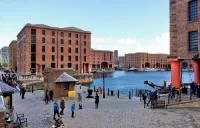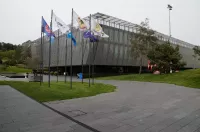The UEFA Super Cup is an annual football match organized by UEFA, contested between the winners of the UEFA Champions League and the UEFA Europa League. Originally known as the Super Competition and later the European Super Cup, it was officially renamed the UEFA Super Cup in 1995 as part of a UEFA rebranding initiative. The Super Cup serves as a curtain-raiser to the European club football season.
Mentioned in this timeline

Liverpool is a port city and metropolitan borough located in...

Football is a family of team sports primarily involving kicking...
Monaco officially the Principality of Monaco is a sovereign city-state...

FIFA the F d ration Internationale de Football Association is...

Barcelona is a major city located on the northeastern coast...
Portugal officially the Portuguese Republic occupies the Iberian Peninsula in...
Trending

20 minutes ago Jade Cargill defends WWE Women's Title against Michin; appears on WWE Raw.

20 minutes ago Chip & Joanna Gaines' son Duke's transformation, Martha Stewart Rugs, Joanna Gaines rug sale.
21 minutes ago Dan Crenshaw faces primary challenge in Texas without Trump's endorsement, races heat up.
21 minutes ago Authorities Respond to Violence in Cancún and Tulum, Quintana Roo Security on Alert.

22 minutes ago Pelicans defeat 76ers as Tyrese Maxey addresses the team's four-game losing streak.

1 hour ago Dennis Prager Discusses Morality, God and Personal Opinion in Recent Articles
Popular

Jesse Jackson is an American civil rights activist politician and...

Barack Obama the th U S President - was the...

Bernie Sanders is a prominent American politician currently serving as...

Michael Joseph Jackson the King of Pop was a highly...
The Winter Olympic Games a major international multi-sport event held...
WWE Raw a professional wrestling television program by WWE airs...